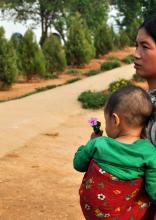Military Regime (163 found)
Training War Criminals? – British Training of the Burmese Army
This briefing examines the British government’s controversial military training to the Burmese Army.
The training is taking place despite the Burmese Army still committing serious human rights abuses which violate international law. Crimes committed by the Burmese Army since the reform process began include rape and gang rape of ethnic women, including children, deliberate targeting of civilians, arbitrary execution, arbitrary detention, torture, mutilations, looting, bombing civilian areas, blocking humanitarian assistance, destruction of property, and extortion. Many of these abuses could be classified as war crimes and crimes against humanity […]
• • •Access Denied: Land Rights and Ethnic Conflict in Burma
 The reform process in Burma/Myanmar1 by the quasi-civilian government of President Thein Sein has raised hopes that a long overdue solution can be found to more than 60 years of devastating civil war. Burma’s ethnic minority groups have long felt marginalized and discriminated against, resulting in a large number of ethnic armed opposition groups fighting the central government – dominated by the ethnic Burman majority – for ethnic rights and autonomy. The fighting has taken place mostly in Burma’s borderlands where ethnic minorities are most concentrated […]
The reform process in Burma/Myanmar1 by the quasi-civilian government of President Thein Sein has raised hopes that a long overdue solution can be found to more than 60 years of devastating civil war. Burma’s ethnic minority groups have long felt marginalized and discriminated against, resulting in a large number of ethnic armed opposition groups fighting the central government – dominated by the ethnic Burman majority – for ethnic rights and autonomy. The fighting has taken place mostly in Burma’s borderlands where ethnic minorities are most concentrated […]
Ending 50 Years of Military Rule? Prospects for Peace, Democracy and Development in Burma
The thaw in the repressive climate of Burma was epitomised by by-elections held in April 2012 in which the opposition National League for Democracy, led by Aung San Suu Kyi, scored a resounding victory. President Thein Sein’s government has also reached initial peace agreements with most armed groups. But the challenges faced by a reformed Burmese state remain vast, while serious doubts remain as to the real commitment of military and business leaders to a thoroughgoing process of democratisation and accountability […]
• • •Steps Towards Peace: Local Participation in the Karen Ceasefire Process
During the ten months since a preliminary ceasefire agreement was reached between representatives of the Government of the Union of Myanmar and the Karen National Union (KNU),[1] negotiators from the two parties have met twice, most recently on September 3rd and 4th, aiming to build trust and progress towards a code of conduct that will set guidelines as to how the armed actors must operate towards each other.[2] As the details of this document have not yet been made public,[3] this moment presents an opportunity to consider what impact the ceasefire has had for villagers in eastern Burma in the last ten months and, based on their perspectives, to suggest further steps that are still needed to ensure sustainable peace.
• • •Burma’s By-Elections: Still Short of International Standards
While the by-elections have limited political significance, they are important because they are being championed as an indicator of progress by the international community after the sham 2010 polls. Despite the hype, the bulk of laws and regulations […]
• • •Untold Miseries: Wartime Abuses and Forced Displacement in Kachin State
In his March 2011 inauguration speech, Burmese President Thein Sein emphasized the importance of ending Burma’s several ethnic armed conflicts, declaring that more than 60 years of ethnic warfare in Burma were due to “dogmatism, sectarian strife, and racism.” Burma’s ethnic minorities had, he said […]
• • •All the information I’ve given you, I faced it myself: Rural testimony on abuse in eastern Burma since November 2010
Human rights abuses faced by ethnic communities across rural eastern Burma have continued since November 2010, and are consistent with patterns KHRG has documented since 1992. Drawing from a dataset of 1,270 oral testimonies, sets of images and documentation […]
• • •Burma’s Parliament – A Tool for Institutionalized Oppression
Despite the regime’s claim that an elected legislature was a crucial step towards the emergence of its “discipline-flourishing democracy,” the Parliament turned out to be the regime’s key tool for institutionalizing oppression.
The pro-regime Union Solidarity and Development Party (USDP)-dominated Parliament refused to repeal the draconian laws that provided the basis for the imprisonment of several thousand political prisoners in recent years […]
• • •Discrimination, Conflict and Corruption: The Ethnic States of Burma
Since achieving independence in January 1948, successive Burmese governments, elected and military dictatorships, have sought to address the complex issues involving the country’s many ethnic groups. They have sought to do this primarily through confronting […]
• • •ျမန္မာ့ႏိုင္ငံေရးသံုးသပ္ခ်က္ (၂/၂၀၁၁) – အမ်ဳိးသား ျပန္လည္ရင္ၾကားေစ့ေရးႏွင့္ ေတြ႕ဆံုးေဆြးေႏြးေရးျဖစ္စဥ္
၁၉၈၈ ဒီမိုကေရစီ အေရးေတာ္ပံုၾကီးအျပီး ျမန္မာ့ဒီမိုကေရစီေခါင္းေဆာင္ ေဒၚေအာင္ဆန္းစုၾကည္နဲ႕ စစ္အစိုးရတို႕ ထိပ္တိုက္ေတြ႕ဆံုေဆြးေႏြးခဲ့တာ ၂၃ႏွစ္တာကာလ အတြင္းမွာ ၁၆ၾကိမ္ေျမာက္ ရွိလာခဲ့ပါျပီ။ ေတြ႕ဆံုေဆြးေႏြးခဲ့တဲ့ မွတ္တမ္းေတြကိုၾကည့္မယ္ဆိုရင္ ၁၉၉၄ ခုႏွစ္မွာ (၂) ၾကိမ္၊ ၂၀၀၂ ခုႏွစ္မွာ (၁) ၾကိမ္၊ ၂၀၀၇ ခုႏွစ္မွာ (၃) ၾကိမ္၊ ၂၀၀၈ ခုႏွစ္မွာ (၃) ၾကိမ္၊ […]
• • •
 All posts
All posts